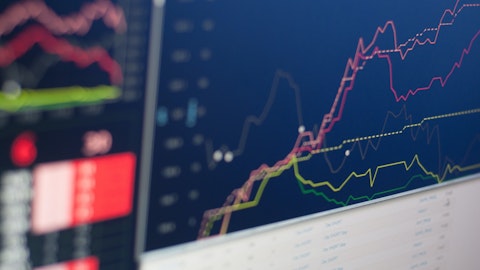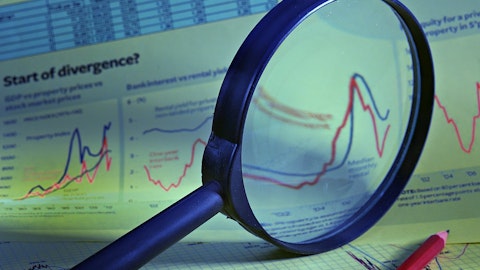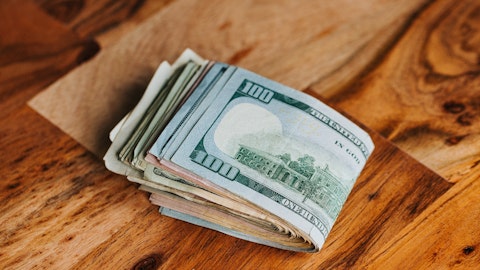In this article, we discuss 5 best stocks to buy before the 2023 recession. If you want to see more stocks in this selection, check out 14 Best Stocks To Buy Before the 2023 Recession.
5. Costco Wholesale Corporation (NASDAQ:COST)
Number of Hedge Fund Holders: 69
Costco Wholesale Corporation (NASDAQ:COST) operates membership warehouses in the United States, Puerto Rico, Canada, the United Kingdom, Mexico, Japan, Korea, Australia, Spain, France, Iceland, China, and Taiwan. It is one of the best recession stocks to invest in. On January 5, Costco Wholesale Corporation (NASDAQ:COST) reported December sales of $23.80 billion, up 7% from $22.24 billion in the same period last year. The company also posted net sales of $82.16 billion for the 18 weeks ended January 1, 2023, compared to $76.34 billion a year ago.
On December 21, Tigress Financial analyst Ivan Feinseth maintained a Buy rating on Costco Wholesale Corporation (NASDAQ:COST) but trimmed the firm’s price target on the shares to $635 from $678, citing a re-rating of valuation. The analyst, who observed that his updated target reflects a potential total return with dividends of nearly 40% from present levels, sees the recent pullback in Costco Wholesale Corporation (NASDAQ:COST) shares as “a major buying opportunity” given the company’s loyal customer base and solid business model.
According to Insider Monkey’s data, 69 hedge funds were long Costco Wholesale Corporation (NASDAQ:COST) at the end of Q3 2022, compared to 64 funds in the earlier quarter. Ken Fisher’s Fisher Asset Management is the largest stakeholder of the company, with 2.5 million shares worth $1.20 billion.
Here is what Cooper Investors Global Equities Fund has to say about Costco Wholesale Corporation (NASDAQ:COST) in its Q3 2022 investor letter:
“The US economy continues to run hot – the labor market is extremely tight and a number of executives we spoke to described their challenges in retaining staff and preventing competitors from poaching talent. Industrial companies in particular continue to see record backlogs, with the easing of logistics and supply chain constraints only just starting to have an impact on deliveries and lead times.
In terms of inflationary pressures, the vast majority of our holdings have been able to leverage strong market positions and stakeholder relationships to push pricing through in 2022 such that minimal impact to earnings has occurred. Clearly this is not a lever that can be pulled indefinitely but the more experienced management teams have kept some of their powder dry. Our meeting with management at Costco in Seattle was memorable for several reasons but one was their latent ability to increase member pricing which they have not done in over 5 years (and thus likely to do in 2023)…
…To conclude we’ll return to our meeting with Costco mentioned earlier. The business quality is no secret after decades of incredible execution, but the meeting gave us renewed conviction around Value Latencies in terms of the runway for growth, the focus on enhancing customer value, Costco’s vast buying power (it purchases 30% of the world’s jumbo cashews as one example) and management’s feral focus on the business model and cost discipline.”
Follow Costco Wholesale Corp W (NASDAQ:COST)
Follow Costco Wholesale Corp W (NASDAQ:COST)
Receive real-time insider trading and news alerts
4. PepsiCo, Inc. (NASDAQ:PEP)
Number of Hedge Fund Holders: 72
PepsiCo, Inc. (NASDAQ:PEP) is one of the most stable consumer staple stocks to invest in for an upcoming recession environment. On November 17, the company declared a $1.15 per share quarterly dividend, in line with previous. The dividend was distributed on January 6. PepsiCo, Inc. (NASDAQ:PEP) has paid consecutive quarterly cash dividends since 1965, and 2022 marked the company’s 50th consecutive annual dividend increase.
On December 7, Argus analyst John Staszak raised the price target on PepsiCo, Inc. (NASDAQ:PEP) to $206 from $195 and kept a Buy rating on the shares. The company is well-managed, provides a strong brand portfolio, and continues to generate resilient growth amid soft demand for many consumer staples, the analyst told investors in a research note.
According to Insider Monkey’s data, 72 hedge funds were bullish on PepsiCo, Inc. (NASDAQ:PEP) at the end of Q3 2022, compared to 65 funds in the prior quarter. Terry Smith’s Fundsmith LLP is the largest stakeholder of the company, with 7.14 million shares worth $1.16 billion.
Here is what Lindsell Train has to say about PepsiCo, Inc. (NYSE:PEP) in its Q3 2022 investor letter:
“At this point, it may help to give a further example of these self-reinforcing moats to illustrate the idea, drawing from the consumer franchises side of our portfolio. In our view, strong consumer brands can similarly exhibit Lindycompatible anti-ageing properties. Consider that the longer a company invests in its brands through advertising and R&D, the stronger and more resonant they may get. When successful, a self-sustaining feedback loop is established, whereby it becomes ever harder to recreate a heritage-rich brand from scratch, raising barriers to entry, and proportionately increasing its likely lifespan. There are plenty of long-lived portfolio franchises I could reference here, but I’ve gone with PepsiCo (NYSE:PEP); partly because we have good time-series stats on it (beware data bias!) but also, as I hope will become evident, because Pepsi over its 129 years has succeeded in creating some wonderfully deep moats.
With Pepsi Cola you get the flagship soft drinks brand, which is both global and generational, but you also get the Frito-Lay salty snacks portfolio assembled alongside it, claiming nearly 40% of the global market. That’s ten-times greater than the nearest competitor and likely higher than the next 65 competitors combined. These are exceptionally strong global bands with market shares to match; the long-term empirical result being Pepsi’s dividend record which over the past 66 years (as far back as we’ve been able to go) has compounded at an annualized rate of 10%. Pepsi is no ‘in at the ground floor’ start-up today, but it wasn’t six decades ago either. Early growth investor Philip Fisher put it well when in 1958 (two years into Pepsi’s current winning streak) he wrote of “companies which in spite of outstanding prospects of major further growth are so financially strong, with roots going so deep into the economic soil, that they qualify under the general classification of ‘institutional stocks’”. PepsiCo fits this description well…” (Click here to see the full text)
Follow Pepsico Inc (NASDAQ:PEP)
Follow Pepsico Inc (NASDAQ:PEP)
Receive real-time insider trading and news alerts
3. AbbVie Inc. (NYSE:ABBV)
Number of Hedge Fund Holders: 80
AbbVie Inc. (NYSE:ABBV) was incorporated in 2012 and is headquartered in North Chicago, Illinois. The company discovers, develops, manufactures, and sells pharmaceuticals worldwide. On January 6, AbbVie Inc. (NYSE:ABBV) signed a collaboration agreement with Immunome, Inc. (NASDAQ:IMNM) to discover up to 10 novel antibody-target pairs for cancer treatments. It is one of the best recession-proof stocks to consider.
On January 5, Truist analyst Robyn Karnauskas raised the price target on AbbVie Inc. (NYSE:ABBV) to $180 from $160 and kept a Buy rating on the shares. The analyst cited increasing prescription and share growth trends for Skyrizi and Rinvoq, in addition to growth in Botox in the aesthetics mark for the target raise.
According to Insider Monkey’s data, 80 hedge funds were long AbbVie Inc. (NYSE:ABBV) at the end of Q3 2022, compared to 71 funds in the last quarter. Peter Rathjens, Bruce Clarke, and John Campbell’s Arrowstreet Capital is a prominent stakeholder of the company, with a position worth $431.60 million.
Here is what Baron Funds specifically said about AbbVie Inc. (NYSE:ABBV) in its Q3 2022 investor letter:
“AbbVie Inc. (NYSE:ABBV) is a drug developer best known for Humira, an immunosuppressant that is the best selling drug of all time. Given outsized key product risk (patent cliff and generic launches beginning in 2023), AbbVie has broadened its pipeline, highlighted by its Allergan acquisition. Shares fell on results that missed consensus and indications that legacy franchises were outperforming newer product launches, calling into question AbbVie’s long-term strategy. With promising assets in the pipeline and its robust cash flow profile, we believe AbbVie will grow well into the future.”
Follow Abbvie Inc. (NYSE:ABBV)
Follow Abbvie Inc. (NYSE:ABBV)
Receive real-time insider trading and news alerts
2. Bank of America Corporation (NYSE:BAC)
Number of Hedge Fund Holders: 97
Bank of America Corporation (NYSE:BAC) is an American multinational investment bank and financial services holding company that caters to individual consumers, small and middle-market businesses, institutional investors, large enterprises, and governments worldwide. Bank of America Corporation (NYSE:BAC) is one of the best stocks to buy for protection against an upcoming recession this year.
On December 5, Bank of America Corporation (NYSE:BAC) announced that it will redeem all outstanding $6 billion of its 3.004% fixed/floating rate senior notes due 2023 on December 20. Redemption price will be equal to 100% of the principal amount of the notes, plus accrued and unpaid interest at the redemption date.
Barclays analyst Jason Goldberg on January 3 maintained an Overweight rating on Bank of America Corporation (NYSE:BAC) but lowered the price target on the shares to $48 from $51. The analyst believes 2023 should see net interest margins peak for the large-cap banks, deposit betas rise, loan growth slow, and loan losses increase.
According to Insider Monkey’s data, 97 hedge funds were bullish on Bank of America Corporation (NYSE:BAC) at the end of Q3 2022, compared to 99 funds in the prior quarter. Warren Buffett’s Berkshire Hathaway is the leading position holder in the company, with more than 1 billion shares worth $30.5 billion.
Ariel Investment made the following comment about Bank of America Corporation (NYSE:BAC) in its Q3 2022 investor letter:
“We initiated three new positions in the quarter. We added leading financial institution Bank of America Corporation (NYSE:BAC) which serves individual consumers, small and middle-market businesses, and large corporations with a full range of banking, investing, asset management, and other financial and risk management products and services. The current company was formed through various mergers including NationsBank, FleetBoston, US Trust, Countrywide Financial, and Merrill Lynch with the legacy commercial bank to form a national banking powerhouse and bulge bracket investment firm. As one of the ‘Big Four’ U.S. banks it enjoys scale driven cost advantages and economies of scale which provide meaningful competitive advantages and potential for strong returns in the largely commoditized banking industry. A survivor of the financial crisis, BAC has emerged with a solid capital base and stands to benefit from a rising interest rate environment.”
Follow Bank Of America Corp (NYSE:BAC)
Follow Bank Of America Corp (NYSE:BAC)
Receive real-time insider trading and news alerts
1. UnitedHealth Group Incorporated (NYSE:UNH)
Number of Hedge Fund Holders: 110
UnitedHealth Group Incorporated (NYSE:UNH) is an American multinational managed healthcare and insurance company that operates through four segments – UnitedHealthcare, Optum Health, Optum Insight, and Optum Rx. UnitedHealth Group Incorporated (NYSE:UNH) is one of the best stocks to buy for a recession portfolio. The company announced guidance for 2023, with revenue forecasted to be between $357 billion to $360 billion. The consensus revenue estimate is $352.95 billion.
On December 7, Credit Suisse analyst A.J. Rice raised the price target on UnitedHealth Group Incorporated (NYSE:UNH) to $610 from $590 as he made no changes to his EPS estimates but rolled forward his valuation to 2024. The analyst kept an Outperform rating on the stock.
According to Insider Monkey’s third quarter database, 110 hedge funds were long UnitedHealth Group Incorporated (NYSE:UNH), compared to 91 funds in the last quarter. Rajiv Jain’s GQG Partners is the leading position holder in the company, with 3.2 million shares worth $1.6 billion.
Here is what Stewart Asset Management has to say about UnitedHealth Group Incorporated (NYSE:UNH) in its Q3 2022 investor letter:
“Looking at the Great Recession which began at year-end 2007 and lasted to mid-year 2009 is helpful too. Our four largest current holdings in the portfolio weathered that period well. UnitedHealth’s (NYSE:UNH) earnings were resilient. While it reported modestly down earnings in 2008, its earnings rebounded quickly to record highs in 2010 and the shares responded strongly in anticipation of this.”
Follow Unitedhealth Group Inc (NYSE:UNH)
Follow Unitedhealth Group Inc (NYSE:UNH)
Receive real-time insider trading and news alerts
Insider Monkey focuses on uncovering the best investment ideas of hedge funds and insiders. Please subscribe to our free daily enewsletter to get the latest investment ideas from hedge funds’ investor letters by entering your email address below. You can also check out Top 10 HR Companies in the World and 10 Best Cryptocurrencies to Invest In.





